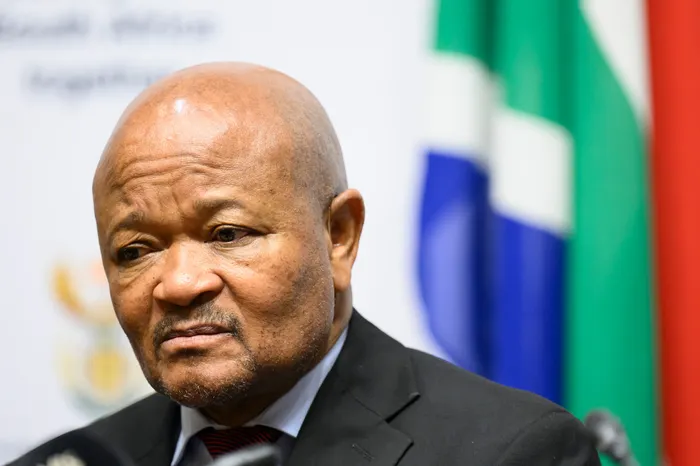Another commission is costly for SA

Police Minister Senzo Mchunu placed on special leave and will be investigated for interfering with police work.
Image: Henk Kruger/Independent Newspapers
PRESIDENT Cyril Ramaphosa’s decision to place Police Minister Senzo Mchunu on special leave, effectively “a paid holiday”, raises serious concerns about the lack of urgency in confronting allegations of widespread criminal infiltration and corruption at the highest levels of SAPS, including his own minister of police.
That is how ActionSA reacted to Ramaphosa's announcement that the allegations made by KwaZulu-Natal police commissioner Nhlanhla Mkhwanazi against Mchunu, among others, necessitated the establishment of a commission of inquiry to be headed by current acting Deputy Chief Justice Mbuyiselo Madlanga.
Mkhwanazi had lifted the lid on serious allegations about the existence and operation of a criminal syndicate that has allegedly infiltrated law enforcement and intelligence structures in South Africa.
He also pinned attempts to disband the Political Killings Task Team on Mchunu, including the removal of key dockets from KwaZulu-Natal to Pretoria allegedly by Deputy National Commissioner for Crime Detection Shadrack Sibiya. Both Mchunu and Sibiya have publicly denied the allegations.
In his address Sunday night, Ramaphosa said Mchunu undertook to give his full cooperation to the commission to enable it to do its work.
Mchunu said: "I welcome and respect the President’s decision and pledge my commitment to the process. Honour and integrity are the virtues I personally subscribe to and which we all need to make efforts to uphold. I stand ready to respond to the accusations against me and account to the citizens of the Republic, fully and honestly so.”
The commission will investigate allegations relating to the infiltration of law enforcement, intelligence and associated institutions within the criminal justice system by criminal syndicates.
It will also investigate the role of current or former senior officials in South African Police Service, National Prosecuting Authority, State Security Agency, the Judiciary and Magistracy, and the metropolitan police departments of Johannesburg, Ekurhuleni and Tshwane who may have aided or abetted the alleged criminal activity; failed to act on credible intelligence or internal warnings; or benefited financially or politically from a syndicate's operations.
Mkhwanazi’s allegations, if proven true, threaten to undermine the confidence of South Africans in the ability of the South African Police Service to protect them and to effectively fight crime and corruption, said Ramaphosa.
“As we intensify the fight against crime, it is vital that we safeguard the integrity and credibility of the police and other law enforcement agencies.”
He said the commission will have the power to refer matters for immediate criminal investigation and urgent decisions on prosecution, taking into account the nature of the allegations and evidence the Commission will uncover.
Reacting to the announcement, ActionSA MP Dereleen James likened Ramaphosa’s delayed action to kicking the can down the road in confronting the deepening crisis within the South African Police Service and the broader criminal justice system.
“What the President failed to acknowledge is that South Africans have long warned of the deep rot within SAPS and its impact on safety and security. Government inaction has allowed this decay to worsen, further eroding the integrity of law enforcement leadership and deepening a national security crisis that can no longer be ignored.”
James questioned the logic of yet another commission of inquiry, especially as the R1 billion Zondo Commission Report into State Capture gathered dust while those it implicated continued to evade justice.
Her remarks were echoed by GOOD Secretary-General Brett Herron, who said: “The appointment of a commission, while well-intentioned, is too slow, too cumbersome, and too costly. We have walked this road before, most notably with the Zondo Commission and we have seen that a commission of inquiry cannot replace a criminal investigation.
"South Africans have grown tired of commissions that reveal what we already know, while those implicated continue to operate with impunity.”
He said the judicial commission cannot suspend, charge, or arrest anyone.
“It can only recommend. And until it does, those implicated remain in place, leaving the system vulnerable and trust further diminished. Only Minister Senzo Mchunu has been placed on special leave, likely earning a ministerial salary for sitting at home.”
Professor Firoz Cachalia has been appointed acting Police Minister.
Cape Times
Related Topics: